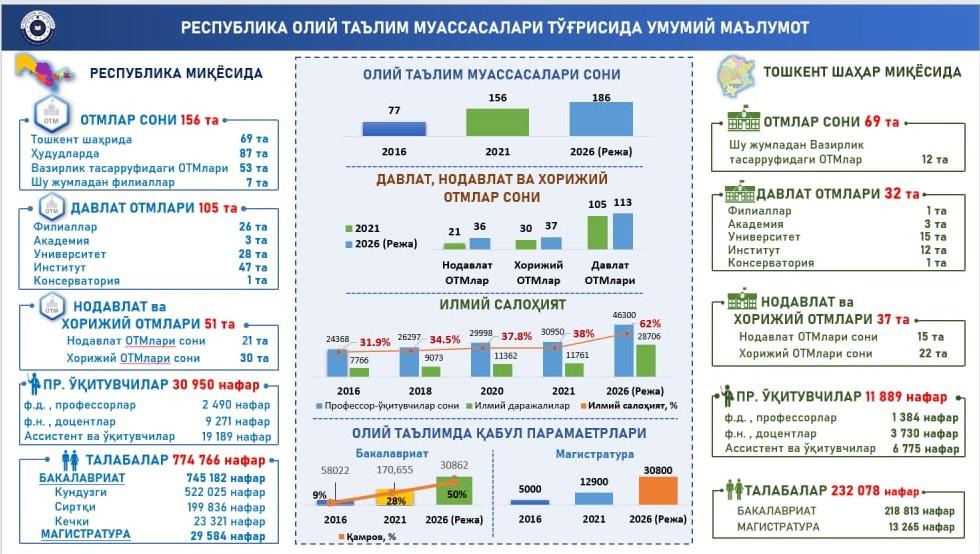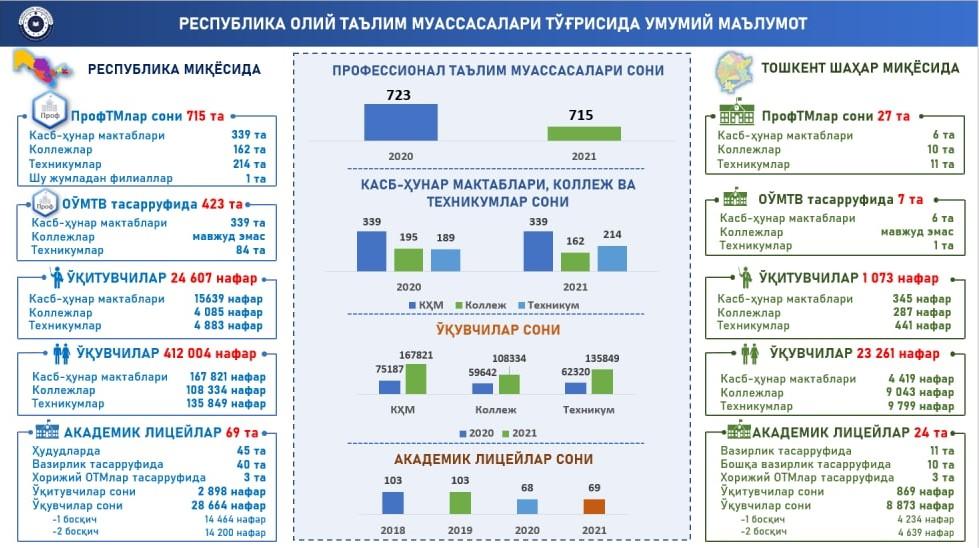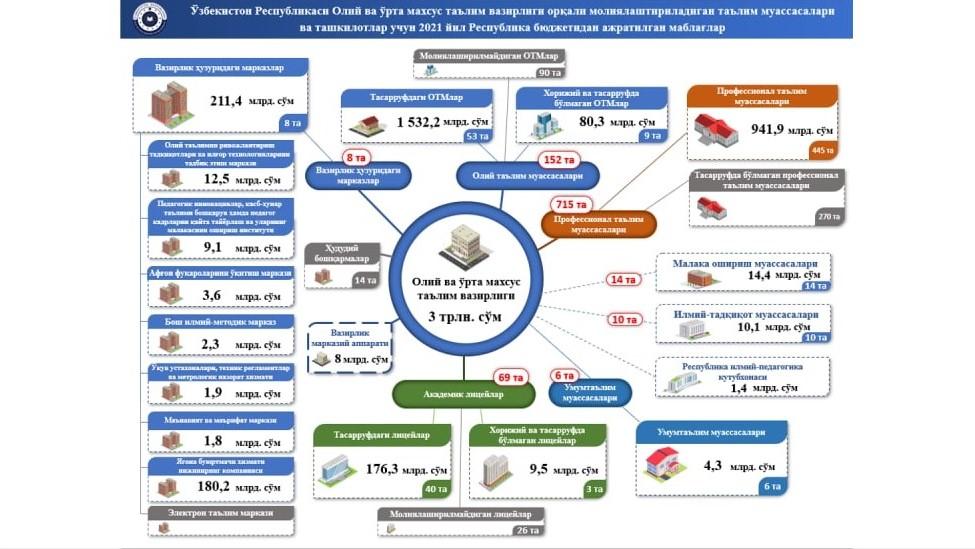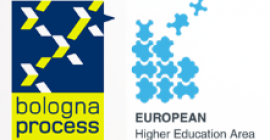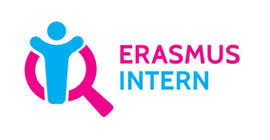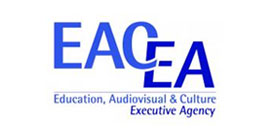Overview
Higher Education Profile (Uzbekistan, as of October 2024)
Number of Higher Education Institutions (HEIs): 212, including 112 state institutions, 70 private HEIs, and 30 branches of international universities in Uzbekistan. (Compared to 156 HEIs in 2022).
Number of students in higher education institutions (Bachelor’s and Master’s levels): 1,553,552. (774,000 as of January 10, 2022).
Number of international students: 13,771. (5,500 as of January 10, 2022).
Structure of the higher education system (years, terms, semesters, Master’s and PhD degree durations):
- Bachelor’s degree – 4 years (8 semesters, two semesters per academic year, with each academic year starting in September);
- Master’s degree – 2 years (4 semesters, two semesters per academic year, with each academic year starting in September);
- PhD – 3 years (each academic year starts in January).
The higher education system in Uzbekistan is composed of a range of institutions, scientific and pedagogical establishments engaged in research, and government bodies responsible for overseeing academic activities. It operates under the framework of the National Programme for Personnel Training, which emphasizes the importance of building on specialized secondary education (academic lyceums) and vocational education (vocational colleges). The system includes two key levels: Bachelor’s degree and Master’s degree programs*.
The Ministry of Higher Education, Science, and Innovation (MHESI) manages the higher education system and is responsible for organizing the academic year, determining the length of semesters, examination schedules, and holidays. The two educational levels are structured as follows:
- Bachelor’s Program: This is the foundational higher education level, providing students with core knowledge in a specific branch of study. It typically lasts a minimum of four years. Graduates receive a Bakalavr degree, which qualifies them to either start their professional careers or continue to a Master’s program.
- Master’s Program: Building on the Bachelor’s degree, the Master’s level focuses on specialized fields and lasts at least two years. Graduates are awarded the Magistr degree, enabling them to work in professional sectors or pursue further academic studies in postgraduate institutions.
More details about Uzbekistan's higher education system can be found on the official MHESI website here and in the Concept of Higher Education System Development until 2030, available on the Erasmus+ NEO website here. For official regulations and legal frameworks, consult the National Database of Legislation on Lex.uz.
A critical document shaping the higher education landscape is the Presidential Decree #UP-5847, dated October 8, 2019, which approved the Concept of Higher Education System Development of Uzbekistan until 2030. This decree outlines long-term reforms aimed at improving the quality of education, developing human capital in line with labor market demands, and driving sustainable social and economic growth.
One of the most significant priorities within these reforms is the expansion of higher education access. Over the past seven years, admission quotas for universities have tripled, with plans to increase the coverage of higher education to 50% of graduates from schools, lyceums, and colleges by 2030. Additionally, reforms have introduced opportunities for free higher education for specific groups, including children of military personnel, low-income families, and winners of various academic and sports competitions. These initiatives aim to make higher education more accessible to all segments of society.
In 2021, university autonomy became a central focus, with 35 state universities granted financial, academic, and administrative independence. This move, enacted by a Presidential Decree on December 24, 2021, marked a significant step toward decentralizing the higher education system and allowing institutions to operate with greater flexibility.
Furthermore, beginning in 2024, higher engineering schools were established within engineering universities as part of an effort to integrate scientific research, innovation, and practical application into the educational process. This initiative aims to enhance the commercialization of research, increase university revenue through patenting and innovation, and strengthen ties between academia, enterprises, and the broader industrial sector.
These reforms collectively aim to align Uzbekistan’s higher education system with international standards, promote innovation, and foster a competitive, modern educational environment that meets the needs of both students and the economy.
Over the past seven years (2017–2023), Uzbekistan has undergone sweeping reforms aimed at transforming its higher education system. These reforms, driven by the need to improve quality and increase the relevance of education, have also strengthened the country’s international cooperation, with the Erasmus+ Programme being a notable contributor to these efforts.
In response to recent global challenges, universities are playing an increasingly critical role in driving transformational changes in society. Uzbekistan has embraced this shift by implementing strategic initiatives focused on fostering innovation and entrepreneurship within its higher education system. A prime example is the country’s collaboration between universities and local tech companies to develop sustainable energy solutions, contributing to national goals for carbon reduction and environmental sustainability. These efforts are part of a broader agenda aimed at advancing technology, sustainability, and social responsibility, further underscoring the important role of universities in addressing global challenges.
For additional insights into the international cooperation within Uzbekistan's higher education system, the following resources can be explored:
1. Ministry of Higher Education, Science, and Innovations (MHESI): Comprehensive information on international collaborations, programs, and partnerships can be found on the MHESI website.
2. Erasmus+ Programme: Detailed descriptions of Uzbekistan’s participation in the Erasmus+ Programme, which supports educational exchange and cooperation with European institutions, can be accessed here.
3. National Database of Legislation of the Republic of Uzbekistan: This resource provides access to legal frameworks governing education and international collaboration. Visit Lex.uz for more information.
4. UNESCO: Information about Uzbekistan’s educational policies and their alignment with international standards can be found on the UNESCO website, particularly regarding educational development initiatives. More details are available here.
5. World Bank Education Sector: The World Bank provides reports and analyses on the state of education in Uzbekistan, including international cooperation and funding. Explore their resources here.
6. ResearchGate: For academic papers and studies related to higher education reforms in Uzbekistan and international collaboration, you can search ResearchGate here.
These links will provide valuable insights into the ongoing efforts and frameworks supporting international cooperation in Uzbekistan's higher education system.
_________________________________________________________
*Prepared by the National Team of HEREs Uzbekistan in October 2024.
Higher educational profile (of Uzbekistan, as of January 10, 2022)
Number of higher education institutions (HEIs): 156 (one hundred fifty-six) including public (105), private HEIs and the campuses of international HEIs in Uzbekistan (both – 51). (in comparison with 77 HEIs in 2016).
Number of students in higher education (bachelors and masters): 774,000 (seven hundred seventy four thousand). (692, 000 (six hundred ninety-two thousand), as of 10th of June, 2021).
Number of international students: 5,500 (five thousand and four hundred). (4, 803 (four thousand eight hundred three), as of 10th of June, 2021).
Number of faculty: 31,000 (thirty one thousand).
Relevant authorities/bodies for higher education:
-Ministry of Higher and Secondary Specialized Education of the Republic of Uzbekistan, web-site: www.edu.uz/en;
-Ministry of Innovative Development, www.mininnovation.uz/en (for doctoral studies and research);
-State Inspectorate for Supervision of Quality In Education under the Cabinet of Ministers of the Republic of Uzbekistan, web-site: www.tdi.uz/en/.
Division of higher education systems (years, quarters, semesters, years of master’s, PhD degrees):
Bachelor's degree – 4 years (8 semesters, two semesters in an academic year, each academic year starts from September);
Master's degree – 2 years (4 semesters, two semesters in an academic year, each academic year starts from September);
PhD – 3 years (each academic year starts from January);
*because of some specific requirements on medical education, division of higher education in medicine is to be checked additionally.
